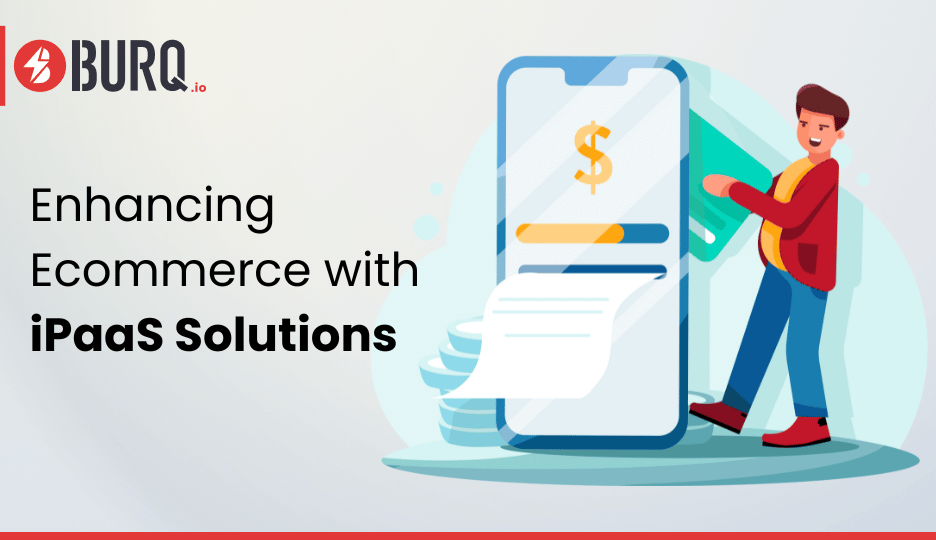In today’s fast-paced digital landscape, businesses are navigating tons of software applications to meet their diverse needs. From customer relationship management to project management, the arsenal of software tools available is vast.
However, this abundance of tools often brings with it a challenge—seamlessly connecting and orchestrating them to work together efficiently. This is where SaaS integration services in cloud computing come into play.
SaaS Integration is the process of connecting different SaaS applications, both within and outside an organization, to function harmoniously as a unified ecosystem. SaaS integration is vital because it addresses the siloed nature of software tools. Without integration, businesses may face several challenges such as data fragmentation, inefficiency, and poor customer experiences.
Implementing SaaS integration services offers a range of advantages, including increased efficiency, improved data visibility, enhanced customer experiences, and agility and scalability. SaaS integration services come in various forms to suit different needs, such as API Integration, Data Integration, and Workflow Automation.
However, selecting the right SaaS integration service provider is a critical decision. Consider factors such as expertise, scalability, security, and cost-effectiveness when making your choice.
Below, we’ll delve deeper into SaaS integration services in cloud computing, exploring the intricacies of different integration types, provide tips for selecting the right service provider, and showcase real-world examples of successful integrations.
So, whether you’re a small startup or a large enterprise, stay tuned as we unravel the world of SaaS integration and its transformative potential for your business.
Benefits of SaaS Integration Services in Cloud Computing
In our previous section, we laid the foundation by understanding what SaaS integration services in cloud computing are and why they’re pivotal in today’s digital landscape. Now, let’s dive deeper into the specific benefits that these services bring to the table.
Increased Efficiency and Productivity
Imagine a scenario where your marketing team is manually transferring data from your e-commerce platform to your email marketing software every time a customer makes a purchase. This not only eats up valuable time but also opens the door to potential errors. Here’s where SaaS integration services in cloud computing swoop in to save the day.
- Automated Workflows: SaaS integration services in cloud computing simplify complex workflows, minimizing manual intervention.
- Real-time Data Sync: Data is synchronized instantly, ensuring that everyone is working with the most up-to-date information.
- Task Efficiency: Routine tasks, such as data entry and report generation, are automated, reducing the burden on employees.
Improved Data Insights
In today’s data-driven world, having a complete view of your data is essential. However, many organizations face the challenge of data fragmentation. Information is scattered across various systems, making it hard to derive meaningful insights. SaaS integration services in cloud computing step in to break down these data silos.
SaaS integration services in cloud computing provide a holistic data view, ensuring that you have a consistent and accurate data source across all your applications. This, in turn, empowers your organization to dig deep into data analytics, uncovering trends and patterns that inform better strategies.
- Data Consistency: All data sources provide the same information, reducing discrepancies.
- Comprehensive Analysis: Integrated data allows for in-depth analysis, revealing actionable insights.
- Timely Reporting: Real-time data access means reports and dashboards are always up to date.
Reduced Costs
In the realm of business, cost reduction is a perennial goal. SaaS integration services in cloud computing contribute to cost savings in several ways. Automation, in particular, leads to resource optimization by reducing the need for manual labor.
- Resource Optimization: Automation reduces the need for manual labor, leading to cost savings in staffing.
- Efficient Resource Allocation: Integrated data helps in optimizing resource allocation by identifying areas where budget adjustments can be made.
- Streamlined Processes: Fewer manual interventions mean reduced operational costs over time.
Improved Customer Service
Exceptional customer service can be a game-changer for businesses. SaaS integration services in cloud computing ensure that customer data is accessible to all relevant teams, leading to improved customer service. Whether a customer contacts sales, support, or marketing, they receive consistent and personalized interactions.
- Personalized Interactions: Integrated systems allow businesses to offer more personalized and relevant services to their customers.
- Faster Issue Resolution: Access to a customer’s complete history enables support teams to resolve issues more swiftly.
- Enhanced Customer Satisfaction: The consistency of service across touchpoints leads to higher customer satisfaction levels.
Increased Competitive Advantage
In today’s highly competitive landscape, any advantage can make a significant difference. SaaS integration services in cloud computing provide a means to gain an edge over competitors. By streamlining operations, making faster decisions, and delivering better customer experiences, businesses can position themselves as leaders in their respective industries.
- Agility: Integration enables businesses to adapt quickly to changing market conditions, staying ahead of competitors.
- Innovative Solutions: With the operational efficiencies gained through integration, organizations have more resources to invest in innovation.
- Market Differentiation: Superior customer experiences achieved through integration can set businesses apart in crowded markets.
Different types of SaaS integration services
Well, now that we have explored the numerous benefits of SaaS integration services in cloud computing, let’s review the various types of SaaS integration services available to businesses, helping you choose the right approach for your specific needs.
Custom SaaS Integration Services
One size doesn’t fit all in the world of SaaS integration. Businesses often have unique requirements, and custom SaaS integration services are designed to cater to these specific needs. Rather than relying on pre-packaged solutions, custom integration is tailored to your organization’s software ecosystem and processes.
- Tailored Solutions: Custom integration is designed to fit your organization like a glove, ensuring that it meets your exact needs.
- Scalability: It can grow with your business, adapting to new systems and processes as your organization evolves.
- Complex Integration: Ideal for intricate integrations that involve a multitude of applications and data sources.
Example: A multinational corporation with a diverse IT landscape may opt for custom SaaS integration services to connect its ERP system with various regional CRM platforms. This will allow them to streamline financial reporting across their global offices while accommodating regional variations.
Integration Platform as a Service, or iPaaS, has emerged as a powerful tool for businesses seeking a comprehensive solution for SaaS integration. iPaaS offerings provide a unified platform to connect various cloud-based and on-premises applications.
- Ease of Use: iPaaS platforms are designed to be user-friendly, allowing non-technical staff to configure integrations.
- Pre-built Connectors: They often come with a library of pre-built connectors to popular SaaS applications, simplifying integration.
- Scalability: iPaaS solutions are scalable, accommodating growing integration needs.
Example: A mid-sized e-commerce company may adopt an iPaaS solution to integrate its e-commerce platform with its inventory management system and shipping software. The drag-and-drop interface will enable them to set up and manage integrations without the need for extensive technical expertise.
Choosing the Right Path
When deciding between custom SaaS integration services and iPaaS, consider your organization’s unique requirements, budget, and the complexity of your integration needs. Custom solutions offer unparalleled flexibility but may require more resources, both in terms of time and budget. iPaaS solutions are quicker to implement and can be more cost-effective, making them a popular choice for many businesses.
It’s important to note that some organizations find a hybrid approach to be the most suitable. This involves using an iPaaS platform as a foundation and then customizing specific aspects of the integration to meet unique requirements.
How to choose a SaaS integration service provider?
Now that we have explored the different types of SaaS integration services, helping you understand the options available for your organization, let’s dive into a crucial aspect of successful integration: choosing the right SaaS integration service provider. This decision can greatly impact the success of your integration journey, so it’s important to make an informed choice.
Understanding the Specific Needs of Your Business
Before you begin your search for a SaaS integration service provider, it’s essential to have a clear understanding of your organization’s specific needs. Start by assessing your current software ecosystem and identifying the pain points that integration can alleviate. Consider the following:
- Identify Integration Goals: Determine what you aim to achieve through integration, such as improved data visibility, streamlined workflows, or enhanced customer experiences.
- Assess Existing Systems: Evaluate your current software applications and data sources, noting any gaps or inefficiencies.
- Future Scalability: Consider your organization’s growth trajectory and how your integration needs might evolve.
The Types of SaaS Applications You Need to Integrate
Not all SaaS integration service providers offer the same range of expertise. Some may specialize in specific types of applications or industries. It’s crucial to align your chosen provider’s expertise with the types of applications you need to integrate.
- Industry Experience: Check if the provider has experience in your industry, as certain sectors may have unique integration requirements.
- Application Compatibility: Ensure that the provider has experience with the SaaS applications you use or plan to implement.
- Case Studies: Review case studies or client references to gauge the provider’s success with similar integration projects.
Your Budget
Budget considerations are a fundamental part of the decision-making process. While integration can deliver significant cost savings and operational efficiencies, it’s important to balance the potential benefits with your available budget.
- Cost Transparency: Understand the pricing structure of the provider, including initial setup costs and ongoing maintenance fees.
- ROI Analysis: Conduct a return on investment (ROI) analysis to determine the long-term value of the integration in relation to your budget.
- Scalability: Consider how the cost of integration may change as your organization grows.
The Experience and Reputation of the Service Provider
The experience and reputation of the SaaS integration service provider can be indicative of their reliability and capability. Research potential providers thoroughly by considering the following factors:
- Years of Operation: A provider with a longer track record may offer more stability and experience.
- Client Testimonials: Read client testimonials and reviews to gauge customer satisfaction.
- Certifications and Partnerships: Check if the provider holds relevant certifications and partnerships with SaaS vendors.
Making the Informed Choice
Selecting the right SaaS integration service provider is a pivotal decision that can significantly impact the success of your integration project. By understanding your organization’s needs, aligning with a provider’s expertise, managing your budget effectively, and considering their experience and reputation, you can make an informed choice that sets your integration journey on the path to success.
Best practices for SaaS integration
Well, now that we have explored the critical process of choosing the right SaaS integration service provider, a decision that can greatly impact the success of your integration project. Now, let’s delve into best practices for implementing SaaS integration services, ensuring a smooth and seamless integration process that maximizes the benefits for your organization.
Plan Your SaaS Integration Carefully
Successful SaaS integration starts with careful planning. Before diving into the technical aspects, take the time to create a comprehensive integration strategy. Consider the following steps:
- Define Objectives: Clearly outline what you aim to achieve through integration, such as automating workflows, improving data visibility, or enhancing customer experiences.
- Assess Data Needs: Identify the data sources and systems that need to be integrated and the data flow between them.
- Create a Timeline: Develop a timeline that outlines key milestones, deadlines, and resource allocation.
Use Pre-built Connectors and Templates Whenever Possible
Efficiency is a cornerstone of successful integration. Many SaaS integration platforms offer pre-built connectors and templates for popular applications. Leveraging these resources can significantly expedite the integration process.
- Time Savings: Pre-built connectors eliminate the need to create integrations from scratch, saving valuable time.
- Reliability: These connectors are often well-tested, reducing the risk of errors and issues.
- Scalability: Templates and connectors can be adjusted and customized to fit specific needs.
Test Your SaaS Integration Thoroughly Before Deploying It
Testing is a critical phase of SaaS integration. Before deploying your integration in a live environment, ensure that it functions as expected. Rigorous testing helps identify and resolve issues before they impact your operations.
- Functional Testing: Verify that the integration accomplishes its intended tasks, such as data synchronization and workflow automation.
- Data Integrity: Confirm that data is transferred accurately and without corruption.
- Security Testing: Ensure that data is protected throughout the integration process.
Monitor Your SaaS Integration After Deployment
Integration doesn’t end with deployment—it’s an ongoing process. Implement robust monitoring to ensure that your integration continues to perform as expected and adapts to changes over time.
- Real-time Monitoring: Implement tools and processes for real-time monitoring of data flows and system performance.
- Alerts and Notifications: Set up alerts to notify you of any issues or anomalies in the integration process.
- Regular Audits: Periodically review and audit your integration to identify areas for improvement.
The Future of SaaS Integration Services in Cloud Computing
As we look ahead, several trends are shaping the landscape of SaaS integration services:
- AI and Machine Learning Integration: The integration of AI and machine learning capabilities into SaaS platforms will enable organizations to extract deeper insights from data, automate complex tasks, and enhance decision-making.
- IoT Integration: With the proliferation of IoT devices, integrating data from these devices into SaaS applications will become increasingly important, facilitating real-time monitoring and analysis.
- Enhanced Security: As data integration becomes more widespread, there will be a heightened focus on ensuring the security of sensitive information during transfer and storage.
- Increased Automation: Automation will continue to play a central role in integration, allowing businesses to streamline workflows and reduce manual intervention.
- Hybrid and Multi-Cloud Integration: As organizations embrace hybrid and multi-cloud environments, integration solutions that seamlessly connect applications across various cloud providers will be in high demand.
- Ecosystem Integration: Integration will extend beyond individual organizations to encompass entire ecosystems, fostering collaboration and data exchange among partners, suppliers, and customers.
Conclusion:
In conclusion, SaaS integration services in cloud computing represent a transformative force for businesses across industries. When implemented strategically and with a focus on best practices, they empower organizations to enhance efficiency, gain valuable insights, reduce costs, improve customer service, and maintain a competitive edge. As technology continues to evolve, staying abreast of emerging trends will be essential for organizations seeking to harness the full potential of SaaS integration services.
At Burq.io , we’re passionate about driving innovation and efficiency through SaaS integration services in cloud computing. With a track record of successful integration projects across various industries, we bring a wealth of experience to the table.
Don’t just adapt to the future—lead it. Connect with Burq.io today and embark on a journey toward seamless SaaS integration that propels your business to new heights.


